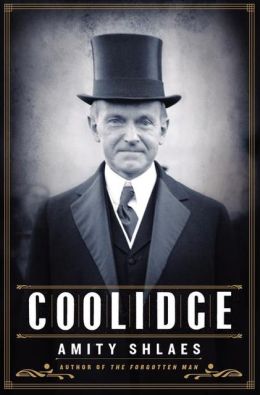 Coolidge (2013) by Amity Shlaes
Coolidge (2013) by Amity ShlaesI requested this particular audiobook from the library because I'm kind of on a presidential history roll here. I didn't know much about the 30th president of the U.S., and I'm fascinated by early 20th century American history so...yeah. Obvious choice, no?
But what really sparked my interest in this book, even before I started listening to it, was that I had to wait five months just to get it because there were six people ahead of me.
Let me repeat that: SIX OTHER PEOPLE WANTED TO LISTEN TO THIS AUDIOBOOK. About Coolidge. You know, dude who was president at one time but if you ask random people on the street who he was they'd probably say "hrrrrrrhhh?" Yeah. But apparently this book is in demand, so now I have a bit more hope for humanity.
Anyway, once I finally got my paws on the book, I wasn't disappointed. Shlaes offers us a fascinating portrait of a man who, to me, was absolutely hilarious (and you're like, "um, are you sure we're still talking about Coolidge?"). For instance, when his wife Grace bought a medical book to consult about common illnesses and whatnot, Coolidge slipped a note in it that said something along the lines of, "well, I couldn't find a cure for SUCKER, so this book isn't any good." And once, upon seeing a particularly argumentative congressional colleague riding a horse, Coolidge remarked to his walking companion, "hey! It's Senator X riding his horse. And they're going in the same direction!"
But it's the detailed background of Calvin Coolidge's life- his boyhood, his time at Amherst, his climb up the political ladder- that tells us the most about the man who restricted himself to a single term on the eve of the stock market crash of 1929, which he saw looming on the horizon. As president at the end of the 1920s, Coolidge devoted himself to cutting the federal budget and lowering the national debt, often prioritizing these above everything else. He believed it his mission to kill unnecessary bills because the fewer laws, the better, he thought. A New Englander by birth, Coolidge was fiercely independent but relied upon trusted colleagues and friends to advise him on a wide range of issues. He didn't say much, but when he did speak, people listened.
Of course, since this is a presidential biography, other presidents didn't fare so well. Herbert Hoover, especially, is pictured as a sneaky, manipulative Cabinet member who tried to outmaneuver Coolidge in a bid for the presidency (Hoover succeeded Coolidge, and probably wished he hadn't). Harding is described as a well-meaning but too-trusting bungler (surprisingly, nothing was mentioned about his bazillion affairs, but whatever...).
I definitely recommend Coolidge, especially if you're interested in presidential history, early-20th century American history, or biographies of fascinating people.
What a review! Thank you. The author would like to give a book or two to your library!
ReplyDeleteOutstanding book. It is surprising that Coolidge does not get more accolades from historians. He brought "normalcy" as he called it to the federal government, which in turn helped bring stability to the economy, and the economy grew by leaps and bounds. Why we believe a president should "do something" to be important is a wrong way to evaluate contributions of our Commander and Chief.
ReplyDelete